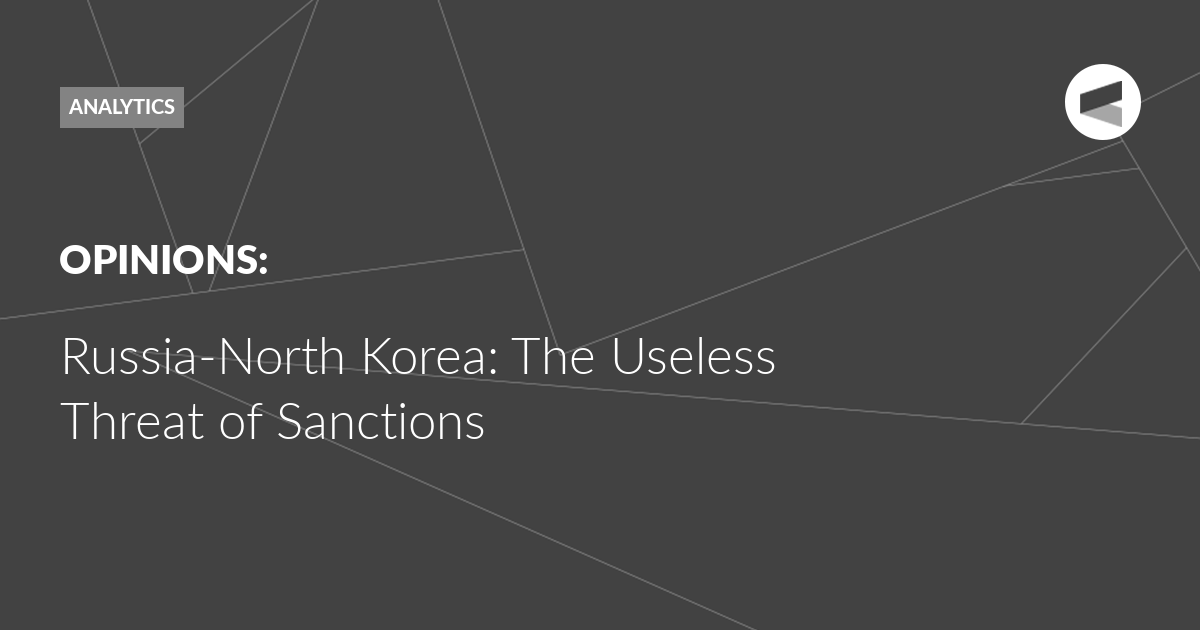High-ranking American officials are reporting the appearance of North Korean military personnel in Russia, and also admit the possibility of their participation in the Ukrainian conflict on the Russian side. The Russian Foreign Ministry characterises such statements as information leaks and hype.
Meanwhile, the United States and its allies have serious cause for concern. The breakdown of relations with Moscow amid the crisis in European security has also led to a change in the balance of power in Northeast Asia. If earlier Russia was a partner in solving the security problems of the Korean Peninsula, including the cooperation with the United States and the countries of the region, now it objectively has no motives for joint work with Washington on the Korean issue. After the start of the special military operation in Ukraine, there was a noticeable rapprochement between Moscow and Pyongyang. An important indicator of this was the Comprehensive Strategic Partnership Treaty between Russia and the DPRK, which the State Duma ratified on October 24 of this year . Cooperation with Russia reduces North Korea’s international isolation. The United States has very few tools it can use to influence both sides. The use of military force against nuclear powers is risky and dangerous, and economic sanctions against both countries make little sense given that they are already subject to large-scale restrictions.
Russia’s rapprochement with the DPRK can be explained by at least three factors. The first and most significant is the grave crisis of European security, the centre of which has become the Ukraine conflict. By providing Kiev with large-scale military and economic assistance, using almost its entire set of unilateral restrictive sanctions against Russia, American diplomacy has encountered Moscow’s asymmetric responses in other areas, very far from the European theatre. For a long time, Russia’s ability to play on several regional boards of world politics at once remained in the shadows. After the start of the Ukrainian crisis in 2014, Russia continued to cooperate with the permanent members of the UN Security Council on the Iranian and North Korean nuclear issues. In other words, the Ukraine crisis was separated from problems in other regions, where Moscow remained a participant in multilateral diplomacy. After the start of the military operation, such a segmented approach no longer worked. Intense rivalry in one part of the world simply could not be combined with cooperation in another. Russia began to return to the age-old principles of the balance of power, implying a coalition game against a common enemy. Cooperation with the DPRK, which has been under total military and economic pressure from the United States for almost 75 years, fits into the principle of the balance of power. Given the current political conditions, the United States and its allies in the region simply have nothing to offer Moscow in exchange for maintaining the status quo. Their policy of containing Russia, albeit varying in intensity, creates powerful incentives for counteraction, including support for the United States’ opponents.
The second important factor was the dynamics of the DPRK’s nuclear missile programme. In the 1990s and 2000s, Russia was a consistent supporter of the denuclearisation of the Korean Peninsula. It was in Moscow’s interests to prevent the proliferation of nuclear weapons and missile technology and, more importantly, to reduce the risk of a nuclear conflict near its borders. Given these interests, Russia was an active participant in the six-party talks on the nuclear missile issue and also worked hard on the issue in the UN Security Council. However, multilateral diplomacy, as well as the unilateral policy of containment by the United States and its allies, failed to prevent the DPRK from acquiring nuclear weapons. A new situation arose when Pyongyang had de facto become a nuclear power without any incentive to abandon this status. The meaning and value of multilateral diplomacy were fading due to the change in the situation, the same relates to the subject of the negotiations. Solving the problem was simply futile.
The third factor is the DPRK and Russia’s resistance to sanctions. North Korea has been subject to total trade and financial restrictions by the United States since the 1950s. In the late 1980s and early 1990s, American sanctions were eased, although a significant portion of them were not lifted. Washington played up the prospect of lifting sanctions in its nuclear negotiations with the DPRK. The 1994 Framework Agreement between the DPRK and the United States implied the development of peaceful nuclear facilities and energy supplies to the DPRK in exchange for Pyongyang’s actual renunciation of nuclear weapons and the verification of its non-nuclear status through international inspections. Washington provided food and other aid to the DPRK, along with Japan, South Korea and other countries. The aid was in great demand against the backdrop of economic difficulties in the DPRK.
However, the implementation of the Framework Agreement has reached a dead end. Pyongyang was in no hurry to completely dismantle its nuclear facilities, and the United States and other countries periodically suspended aid. Six-party talks involving the DPRK, the Republic of Korea, the United States, Japan, China, and Russia also failed to achieve success. The DPRK conducted its first nuclear tests in 2006, which led to the internationalisation of sanctions—their application by the UN Security Council. From 2006 to 2017, the UN Security Council adopted ten resolutions tightening sanctions in response to North Korea’s missile and nuclear tests. By the end of 2017, the international sanctions regime could be considered total. The restrictions included bans on imports from the DPRK of ferrous and non-ferrous metals and ores, seafood, textiles, agricultural products, mechanical engineering, etc. Export controls were in effect against the country, including military and industrial goods. Transport sanctions were introduced, including inspections of North Korean ships. The ability of North Korean citizens to work abroad was limited.
The United States and its allies completed the UN sanctions regime with their unilateral restrictive measures. On the one hand, the internationalisation of sanctions could be considered as a success of American diplomacy – many of the restrictive US measures acquired an international character. However, even in this configuration, the United States, for which the DPRK is one of its fundamental opponents, could not stop Pyongyang from acquiring nuclear weapons under sanctions. Moreover, the sanctions mechanism itself in relations with the DPRK lost its value, since the most severe of them had already been applied.
As for Russia, sanctions against it reappeared in 2012 for the first time since the Cold War. After the start of the Ukraine crisis in 2014, their escalation began and a coalition of countries initiating sanctions began to form. Since 2022, a coalition of 50 countries led by the United States has been using almost all possible instruments of restrictive measures against Russia. Due to Russia’s role and place in the UN Security Council, the internationalisation of sanctions against Moscow in a way akin to the North Korean scenario is simply impossible. But the US is trying to ensure that its sanctions regimes are implemented by countries friendly to Russia, threatening secondary sanctions against their businesses. However, sanctions do not bring political success. Russia has not changed its course in relations with Ukraine and the collective West and has even proven more dauntless. The sanctions have damaged the economy, but could not lead to any noticeable crisis or disruption of macroeconomic stability. In other words, the sanctions have lost their power in attempts to put pressure on Russia. The threat of unilateral restrictive measures on the grounds of cooperation with the DPRK will simply be ignored by Moscow, if only because a large number of restrictions have already been imposed on Russia.
The Treaty on Comprehensive Strategic Partnership between Russia and the DPRK provides for a fairly wide range of opportunities for cooperation between the two countries. How exactly its provisions will be applied is a matter of time and the political will of the two countries. It is obvious that security issues may take a centre stage. The DPRK’s involvement in European affairs remains an open question. It is possible that the Republic of Korea may simultaneously become involved or is already becoming involved. It is obvious that the US will not be able to prevent such a development of the situation, either via the threat of force or sanctions.
The Valdai Discussion Club was established in 2004. It is named after Lake Valdai, which is located close to Veliky Novgorod, where the Club’s first meeting took place.
Please visit the firm link to site






